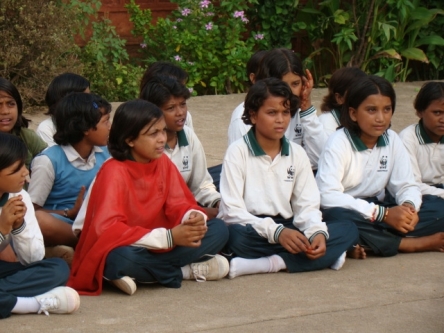ICTpost News Network
Judging by the neatly stacked books in this room for 6th-standard students, it is hard to imagine that until recently these children’s families spent their lives hunting and poaching in the jungles, and never went to school. At this boys’ hostel for 75 students in Panna district, Madhya Pradesh, children from the Bahelia community get a chance to study English, Hindi, science and mathematics instead of being trained in traditional poaching skills.
Vikrant Bahelia, a student, says, “Before I joined my studies, my life in the jungles was like that of an animal. While hunting, I would just wander and not bathe for months. But now I feel that was not a good life.” Balbeer, a 7th-class student, adds, “We want to continue our studies and make a place for ourselves in society.”
Pardhi Project
Vikrant and Balbeer’s views reflect the story of hundreds of Pardhi and Bahelia children who have started going to school under the Pardhi Project, an effort of the Panna Tiger Reserve under the aegis of the Sarva Shiksha Abhiyan.
The Bahelias have traditionally been skilled in tiger hunting and poaching. In view of this, the Panna Tiger Reserve started the project with the twin objectives of tiger conservation and connecting the younger generation of the community with the mainstream.
As of now, 250 children from 199 Bahelia families are receiving an education, of which 50 per cent are girls.
Big change
Two years ago, Kheer Babu and Kunti Bi could be seen wandering through the thick jungles of Madhya Pradesh and Gujarat with their children, Chhipe Raja and Ghhipe Thakur. Today, the children go to school and the change has inspired the parents too. Babu has left hunting and now works as a guard at the Paryavaran forest in Panna. He says, “The children’s schooling has inspired us to lead a settled life.”
This Bahelia couple’s story is part of an emerging pattern. Community-members are now joining the self-employment schemes of the Panna Forest Department.
According to media reports in recent years, there are very few tigers left in the Panna and Sariska tiger reserves. The huge demand for tiger bones, claws and skin in countries such as China, Taiwan and South Korea, however, shows no signs of abating.
Rajesh Kumar Singh, the SP (Guna. Madhya Pradesh), who played a key role in implementing this project says, “These children saw only hunting, and thought this was the only life to lead. But when they started studying, they realized poaching was wrong.”
R. Srinivasmurthy, former field director of the Panna Tiger Reserve, says that joining school has resulted in a significant change in the lifestyle of Bahelia children. However, he adds that more effort is required.
He says, “The phenomenon of children dropping out is a challenge. Besides, we need a dedicated workforce for the project.”
The intense poverty of Bahelia families is a major reason for the high dropout rate. Most families engage children in small jobs so that they can contribute to the family income.
Role of ICT
ICT can play a big role in such projects to provide quality education. In the twelfth plan, The Planning Commission of India has stressed that ICT tools must be used for significantly improving the educational services and for streamlining the admission process. Says educationist Prof. Khalid Moidu, ICT is integral to the teaching learning process. In an age where massive expansion of education is required, we cannot do without the use of technology. ICT is vital for dissemination of knowledge, for evaluation and for keeping data and records. The role of ICT is multi faceted and it has to be exploited to the maximum potential.?
The new education policy document states, Information and Communication Technologies (ICTs) should be harnessed to enrich teaching-learning experience, to extend and diversify delivery, improve research quality and collaboration by making knowledge and information widely available, and ensure effective governance both at the institutional and systemic level. It says that student services needs to be significantly improved and admissions should be streamlined.editor@ictpost.com








